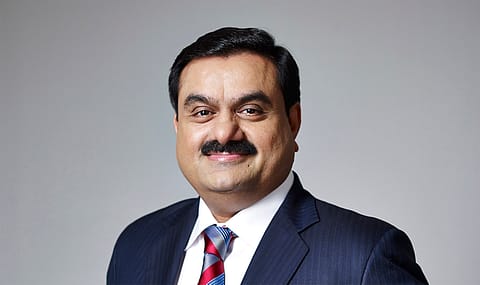Gautam Adani on massive ₹60,000 cr healthcare push: ‘We entered because the momentum wasn’t enough’
Adani emphasised that healthcare in India requires not incremental upgrades but a systemic overhaul.

Adani Group chairman Gautam Adani today gave a clarion call for entrepreneurial participation to transform India’s ailing healthcare system, particularly targeting what he called a “spinal epidemic” sweeping across the country.
“India is facing a spinal epidemic, a silent crisis far more widespread than global averages. Nearly one in two adult Indians experiences low back pain every year. This is not merely a health issue. It is a national crisis measured not just in pain, but in lost productivity, mounting healthcare costs, and destroyed dreams,” Adani said today during his address at the Taj Mahal Palace in Mumbai.
Addressing the 5th Annual Conference of the Society for Minimally Invasive Spine Surgery – Asia Pacific (SMISS-AP), Adani explained the rationale behind the Group’s foray into healthcare, reiterating the ₹60,000 crore commitment made on his 60th birthday towards healthcare, education, and skill development.
“We did not enter healthcare because it lacked momentum. We entered because the momentum was not enough,” he said.
Earlier in June this year, Fortune India had reported that the Group has already kicked off its ₹60,000 crore commitment towards healthcare and education with the launch of two large-scale medical campuses in Ahmedabad and Mumbai. These 1,000-bed integrated facilities, called Adani Healthcare Temples, will include medical colleges, wellness centres, and research hubs. The Mayo Clinic is advising the Group on design and global standards.
The project is being implemented under the Adani Health City (AHC) initiative through the Group’s not-for-profit healthcare arm. An initial ₹6,000 crore has been allocated for the Ahmedabad and Mumbai campuses, with more such health cities planned across India.
Each AHC campus is expected to feature a medical college with 150 MBBS seats, over 80 residency positions, 40 fellowships, and cutting-edge research infrastructure. The campuses will offer multi-super-specialty care, transitional care units, and focus heavily on AI, clinical research, and biomedical informatics, with the aim to serve patients across income levels while training future medical leaders.
Recommended Stories
Adani emphasised that healthcare in India requires not incremental upgrades but a systemic overhaul.
“As the landscape unfolded, one truth stood out — healthcare does not need incremental upgrades. It needs a system-wide redesign. Not an evolution but a revolution rooted in intelligence as well as empathy. We saw the opportunity not to compete within the system, but to help reimagine it,” Adani added.
He urged entrepreneurs to step forward with bold ideas: an AI-powered spinal diagnostic platform, mobile rural operating theatres, and advanced centres for robotic and regenerative spinal surgery. “If we are to carry the full weight of our national ambition, we must first heal the spine of our people,” he said.
He outlined a vision where clinical care, research, and academic training work in tandem, with strong links to adjacent sectors like technology and management. He also highlighted the need to train doctors in AI, robotics, and systems thinking, while enhancing nursing and paramedical education with top-tier institutions and rigorous protocols.
(INR CR)
“Healthcare needs to be reimagined — integrated, intelligent, inclusive, and inspired,” Adani concluded, calling on the next generation of medical entrepreneurs to act with audacity and empathy in reshaping the sector for India’s future.